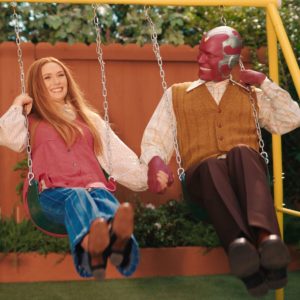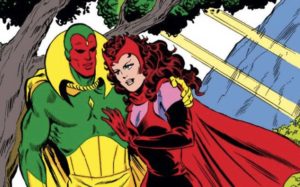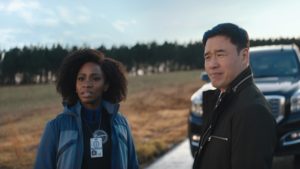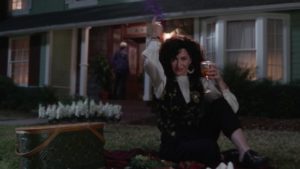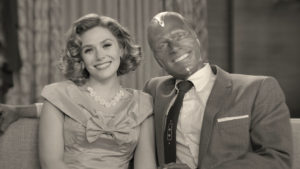If I read the reviews of WandaVision correctly, those who didn’t like the latest, just-completed manifestation of the Marvel Cinematic Universe came in two categories: those who hate on sight whatever the MCU manifests and those who think the situation comedy parodies are the only possible reason for the series’ existence and (therefore) believe them to have made a flimsy (at best) premise for a full-fledged series. There’s little you can do about the MCU haters because they made up their minds long ago that those absorbed in Marvel’s mythology are all hyperventilating, arrogant, sub-human adolescent males of varying ages who have it in for cinema-as-we-know-it. An understandable simplification, but wrong on at least a couple levels if the teenaged girls materializing in bunches at MCU movies since the century began are any indication. They’re the ones who grew up with all those Avengers and Mutants and were likely far ahead of the critics, even the non-haters among them, in grasping what WandaVision was up to from the beginning.
[SPOILERS AHEAD, SO STOP RIGHT HERE IF YOU STILL HAVEN’T WATCHED ANY WANDAVISION ON THE DISNEY CHANNEL. JUST SAYING…]
For those who don’t know and/or are in any way curious, WandaVision is an eight-episode sequel-of-sorts to the 2019 MCU epic, Avengers: Endgame in which Wanda Maximoff (Elizabeth Olsen) a.k.a. The Scarlet Witch was compelled by the apocalypse beast-man-alien Thanos (I really don’t have the time here) to sacrifice her lover Vision (Paul Bettany), a.k.a. The Vision, an android who (that?) somehow acquired a soul with his human persona. Though the world-as-we-or-they-knew-it is essentially restored, Vision is not and the grieving Scarlet Witch decides to remake a nondescript town in the middle of New Jersey into a simulacrum of the dream life Wanda’s always wanted, with Vision able to hide his identity behind an avuncular horn-rimmed façade and a pair of sons who are both cute and mischievous. There’s even a Wacky Next-Door Neighbor who, because she’s played by Kathryn Hahn, cannot possibly be what she seems – and isn’t, but we’ll talk about her later.
The gimmick that drew viewers and even MCU haters at first was the sitcom angle, where each week depicted Wanda and Vision’s simulated home life in the style and trappings of various eras of half-hour TV family comedies: from black-and-white kinescopes with canned laughter, wide lapels and bulky circa-1950s gas guzzlers through the gaudy “living color” mid-to-late-1960s sheen all the way to the fake-reality motifs of the Modern Family type. As with most gimmicks, the parodies were smart enough to arouse early buzz. But as noted earlier, critics thought the joke was going to wear thin. This was before they and the rest of us began realizing Something Else was going on. And it was far more than an extension and elaboration of a comic-book mythology.
Briefly: outside of Wanda’s dreamy-creamy cocoon, officials of the U.S. government agency S.W.O.R.D. (again, I really don’t have the time) have formed a cordon monitoring the show. A rogue agency head (Josh Stamberg) is ready to move in and wipe out Wanda, her dream life and, if necessary, the townspeople playing their parts under her spell. Standing in his way are FBI special agent Jimmy Wu (Randall Park), data analyst Darcy Lewis (Kat Dennings) and S.W.O.R.D. operative Monica Rambeau (Teyonah Parris), the latter of whom is also not quite what she seems, only we’re not yet sure what that is, so we probably won’t talk about that here.
The latter trio are quicker to understand, in ways not even the show’s audience did at first, that Wanda is mostly acting out of a wrenching grief whose depths she isn’t able to completely gauge or totally understand. Hence the infrequent bursts of conscience and second-guessing emerging through the simulated Vision and the way the whole landscape of her dream wobbles and phases in and out like a vintage picture tube struggling to stay in focus. It was at this point that WandaVision shape-shifted from a MAD-like parody into something with a deeper, more profound ingenuity and intent: an inquiry into a damaged soul in conflict with itself. For most of its middle-and-later episodes, this series seemed poised to do something that nothing before exhibited by a comic-book franchise had ever dared; the kind of genre-warping humanism most of us adolescents of a certain age remember going to Marvel Comics for in the first place.
Then suddenly…as comic book panels habitually proclaim, the series seemed to snap out of its more thoughtful intervals to remember what it was there to do all along. And so, the latter two episodes transfigured Hahn’s Wacky Neighbor (or was it “Nosy Neighbor”?) into Agatha Harkness, a supporting character in the Marvel Universe who in this quadrant is a really wicked witch prepared to do to both Wanda and her dream life what the government was about to. There is, as Marvel’s True Believers are conditioned to expect, a noisy and protracted climactic battle, actually two of them: one with Agatha and Wanda firing red and purple hexes t each other, the other with Wanda’s Dream Vision duking it out with a newly—rebuilt Vision sent by S.W.O.R.D.’s spoilsports to devastate Wanda and the whole town. Scarlet beats Violet, New Vision flies away, Old Vision fades away with the rest of Wanda’s fantasy. All done – with of course a few of the customary Easter eggs True Believers count on at the end of every Marvel production for whatever’s happening in the future.
It was, in short, an ending that was sometimes touching, but also felt somehow desultory, a conclusion that, whatever else it provided in visceral catharsis, was unworthy of the emotional complexities and internal conflicts that led up to it. Which is not untypical of these limited-run steaming series. The third season of Star Trek: Discovery likewise showed promise throughout its run of shedding some of its more lugubrious tendencies and developing its own agile identity in relief from the franchise’s past. But it too resolved its many plot elements in the manner of a rush-hour traffic maelstrom that barely avoided irreparable damage.
For those of us who seek out genre works that don’t just satisfy expectations, but dare to transcend them, a show like WandaVision, however modest in scale and intent, offers tremendous promise in its process, but always threatens to disappoint in its execution. One can’t blame the actors for this. Bettany was, as he often is, exemplary and persuasive in his own displays of imagination and grace, even in the most absurd situations. It was also nice to know that Olsen can be as genuinely funny as she is intense. Hahn, one of our best and subtlest comic actors, took full advantage of her opportunity to soar way over the top here and while I’m not sure I’m ready for her to do so again, or often, she, along with everybody else in the cast, seemed to be enjoying herself.
This isn’t the time or place to ask me what I think happens next with these characters or, for that matter, the rest of the MCU from here on. But the way things are right now with the entertainment industry, I’m suspecting the screens exhibiting Our Heroes’ future endeavors will be somewhat smaller than the ones that first showed Avengers: Endgame. This would be fine with me as I’ve often believed that the quality of comic-book films increases in direct proportion to how the delivery of their images diminishes. Whatever misgivings I had about how it wound down, WandaVision for the most part proved my (admittedly unwieldy) hypothesis.
